📝 Note: This article was last updated on Jan. 21, 2026. We regularly update the information to ensure you have the latest insights! 😊
On Reddit, one developer vividly described the lifecycle of Microsoft Access as below:
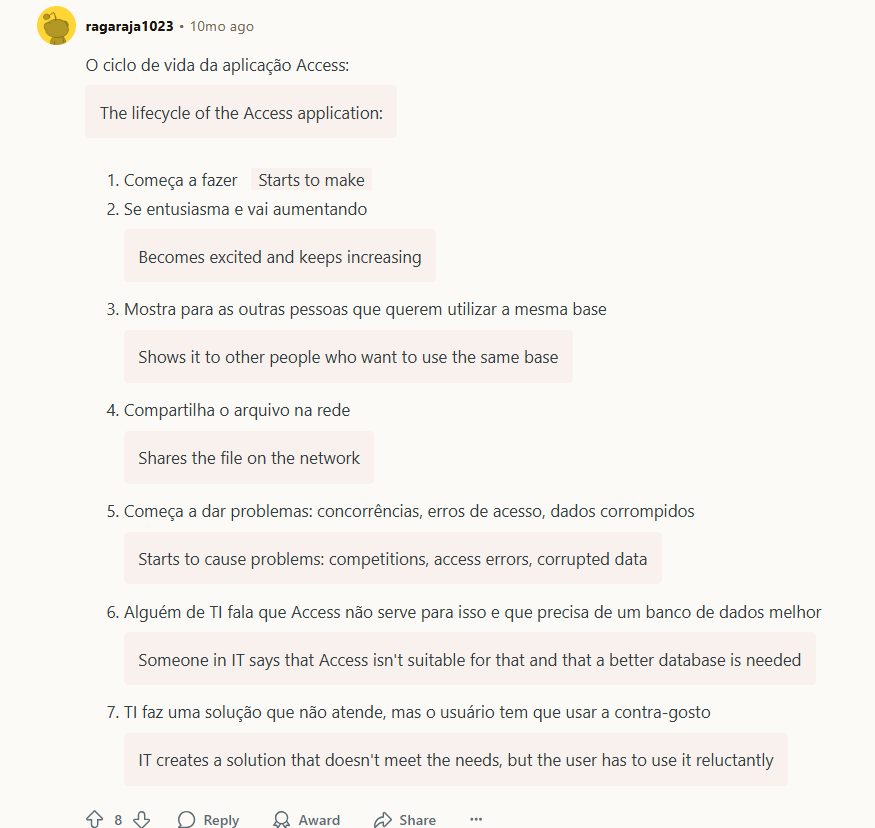
This description neatly sums up how Access is often used in real-world businesses: starting as a convenient tool, then shared across teams, eventually running into corruption and performance bottlenecks, and finally being replaced by more modern database solutions.
💬 Hey, you’re reading the NocoBase blog. NocoBase is the most extensible AI-powered no-code/low-code development platform for building enterprise applications, internal tools, and all kinds of systems. It’s fully self-hosted, plugin-based, and developer-friendly. → Explore NocoBase on GitHub
As part of the Microsoft Office suite, Access is indeed easy to get started with. However, it has well-known limitations in performance, security, and scalability:
- Limited performance: The maximum size of a single database file is 2GB. Performance declines sharply with large datasets and high concurrency.
- Weak security: Database files can be easily copied, and password protection is not robust.
- Poor scalability: Difficult to scale alongside growing business needs.
These issues are frequently mentioned by real users:
Access files struggle with large datasets, prompting users to migrate to Power BI or other tools.

In some organizations, Access survives as a legacy system. When problems arise, teams must fix them on their own because IT no longer supports Access.

Some team members still use Access but find it outdated. Exporting large datasets is limited, and handling engineering-scale data becomes inefficient.

To overcome these limitations in performance, security, and scalability, more and more organizations are turning to modern open source alternatives.
These tools go beyond simple database management—they also include no-code development platforms. They can replicate Access’s database functionality in some scenarios while providing stronger scalability, multi-user collaboration, and better security.
NocoBase
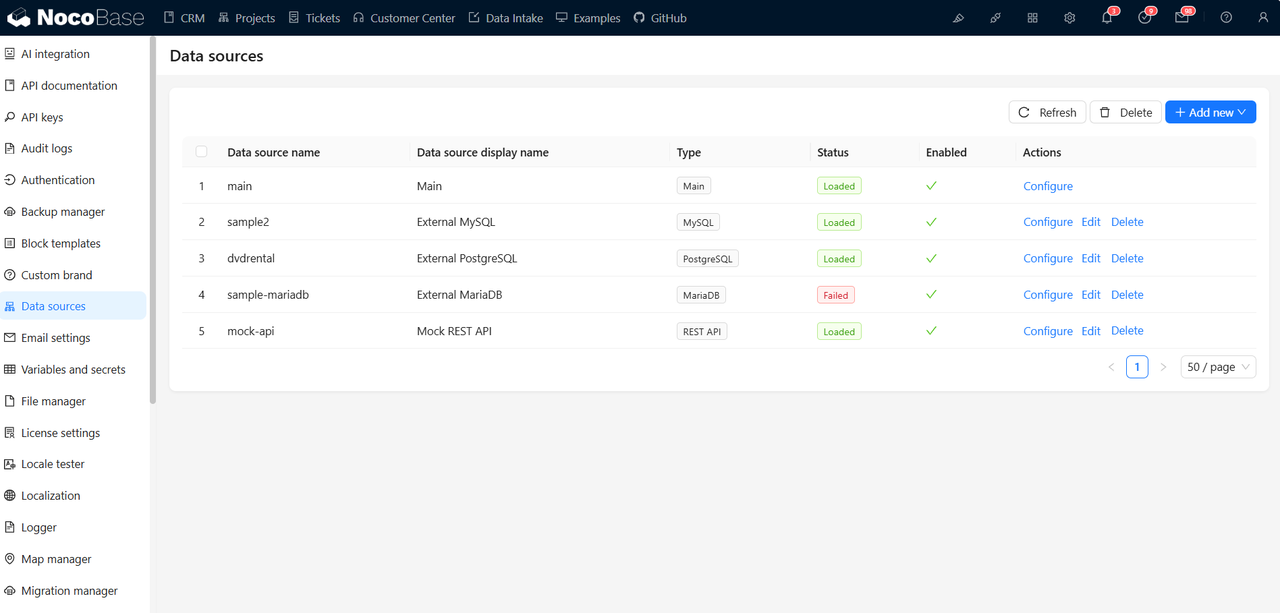
Overview
NocoBase is a highly extensible, open-source AI low-code / no-code platform designed for enterprise applications and business systems. It supports visual data modeling, permission management, and workflow configuration, and can be flexibly extended through plugins to address complex business requirements.
Unlike Microsoft Access, which is a desktop database tool, NocoBase is a AI comprehensive platform for building online business applications. In many enterprise use cases—such as collaborative databases, form-driven applications, departmental data management, and visual reporting—NocoBase can serve as a modern alternative to Access.
- GitHub Star: ⭐21.3k
- GitHub: https://github.com/nocobase/nocobase
- Website: https://www.nocobase.com
Key Highlights as an Access Alternative
- Visual data modeling: Supports multi-table relationships and rich field types, with intuitive visualization of data structures for designing complex models.
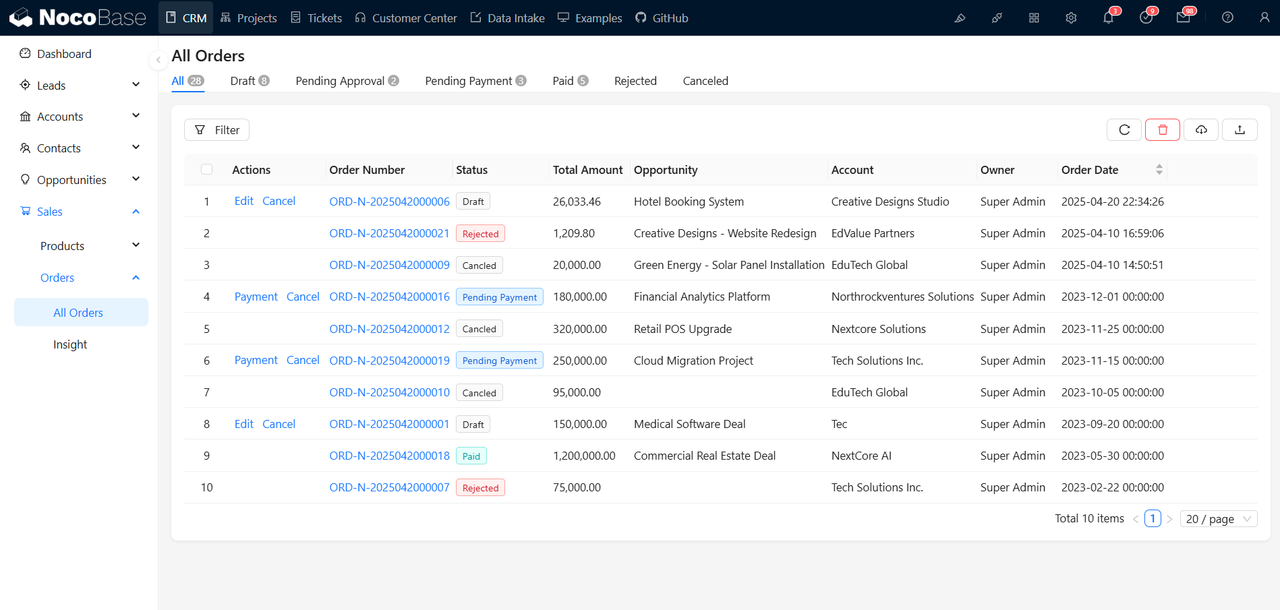
- Granular permissions & collaboration: Role-, condition-, and field-level access controls, enabling secure multi-user operations.
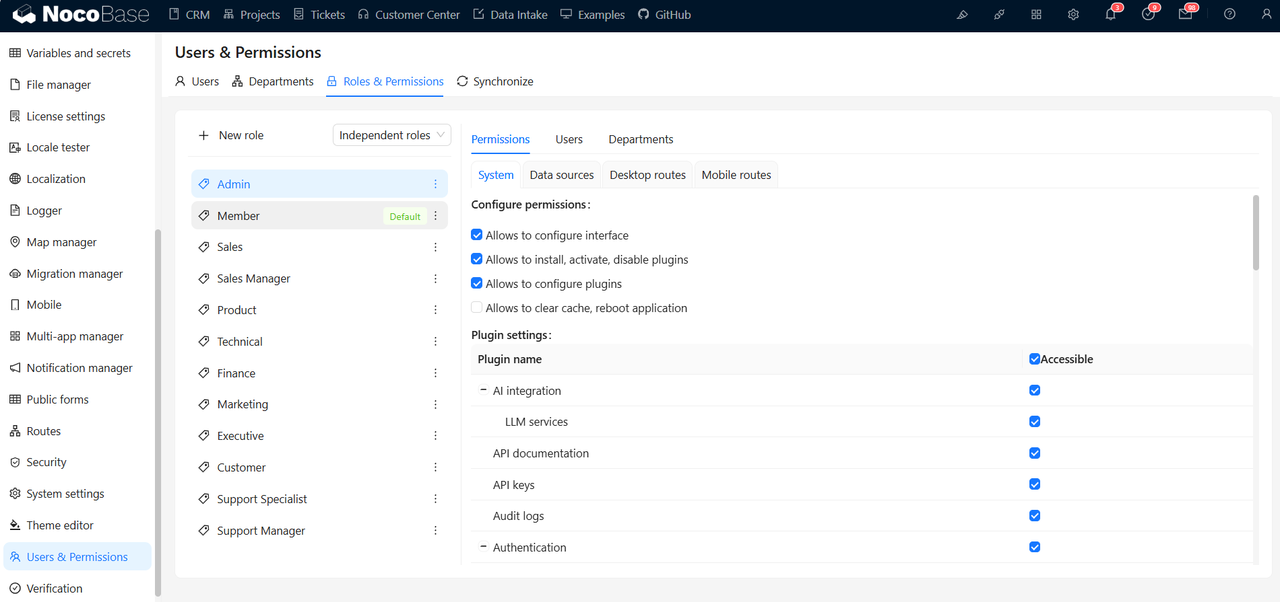
- Flexible workflows: Build business process automation (approvals, reminders, etc.) without deep programming knowledge.
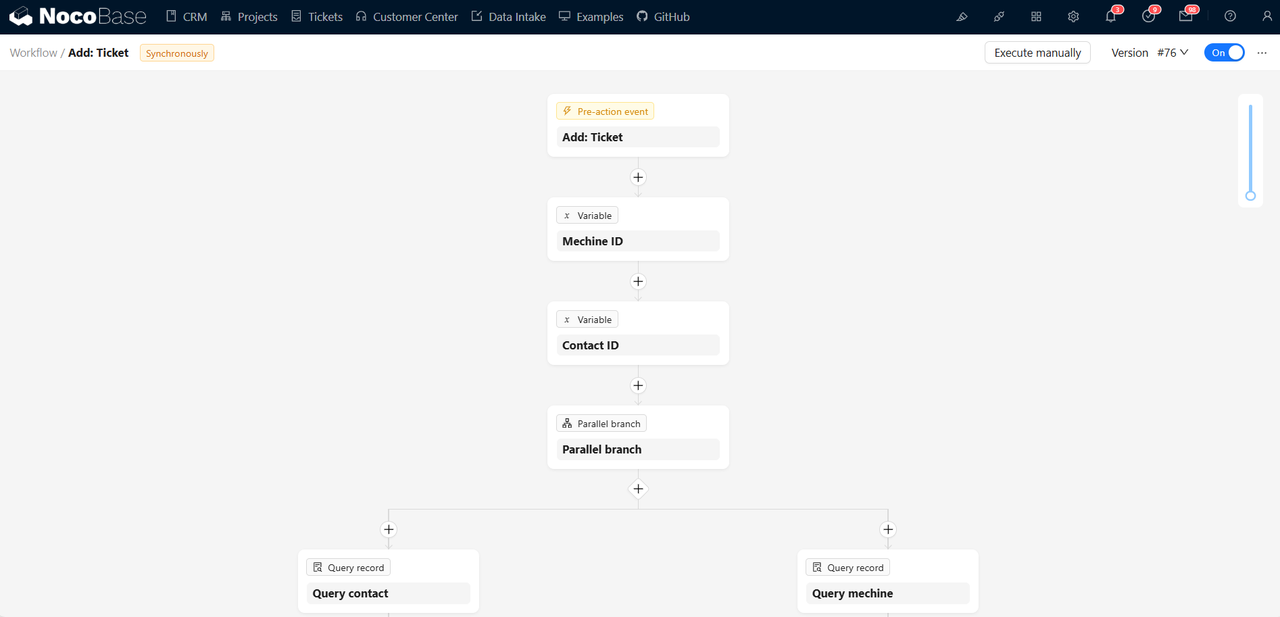
- Plugin ecosystem: Extend functionality via APIs and plugins, connecting with external databases, APIs, and third-party services.
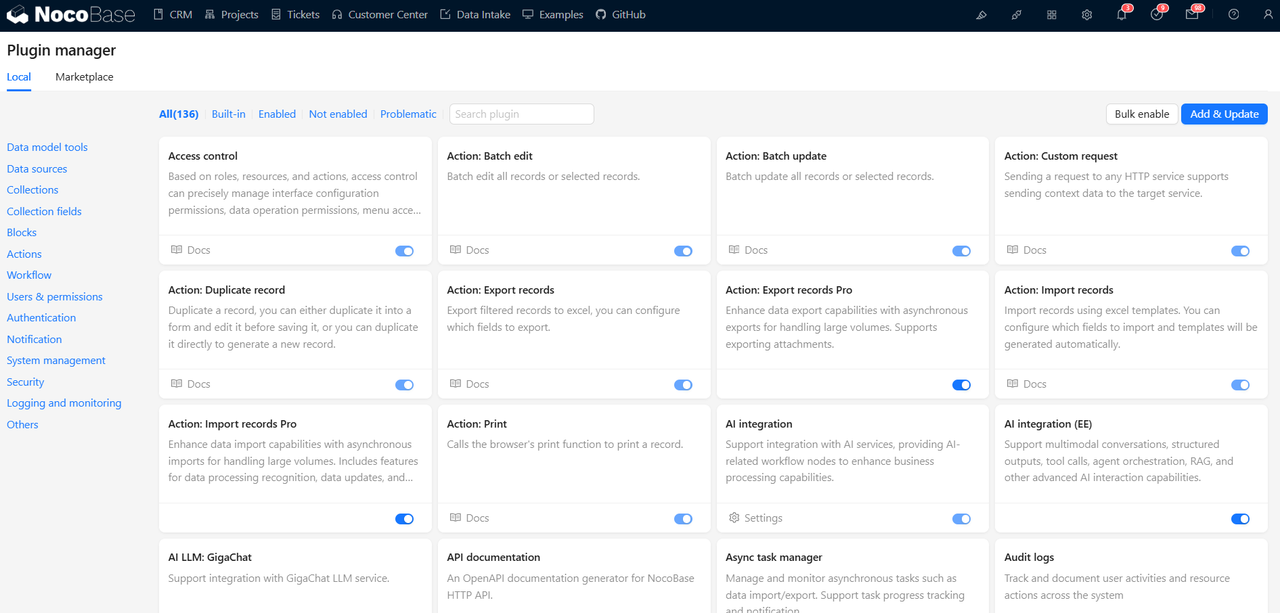
- AI employees embedded in the system: Seamlessly integrate AI capabilities into user interfaces, business workflows, and data contexts, enabling AI to be practically applied in real enterprise scenarios.
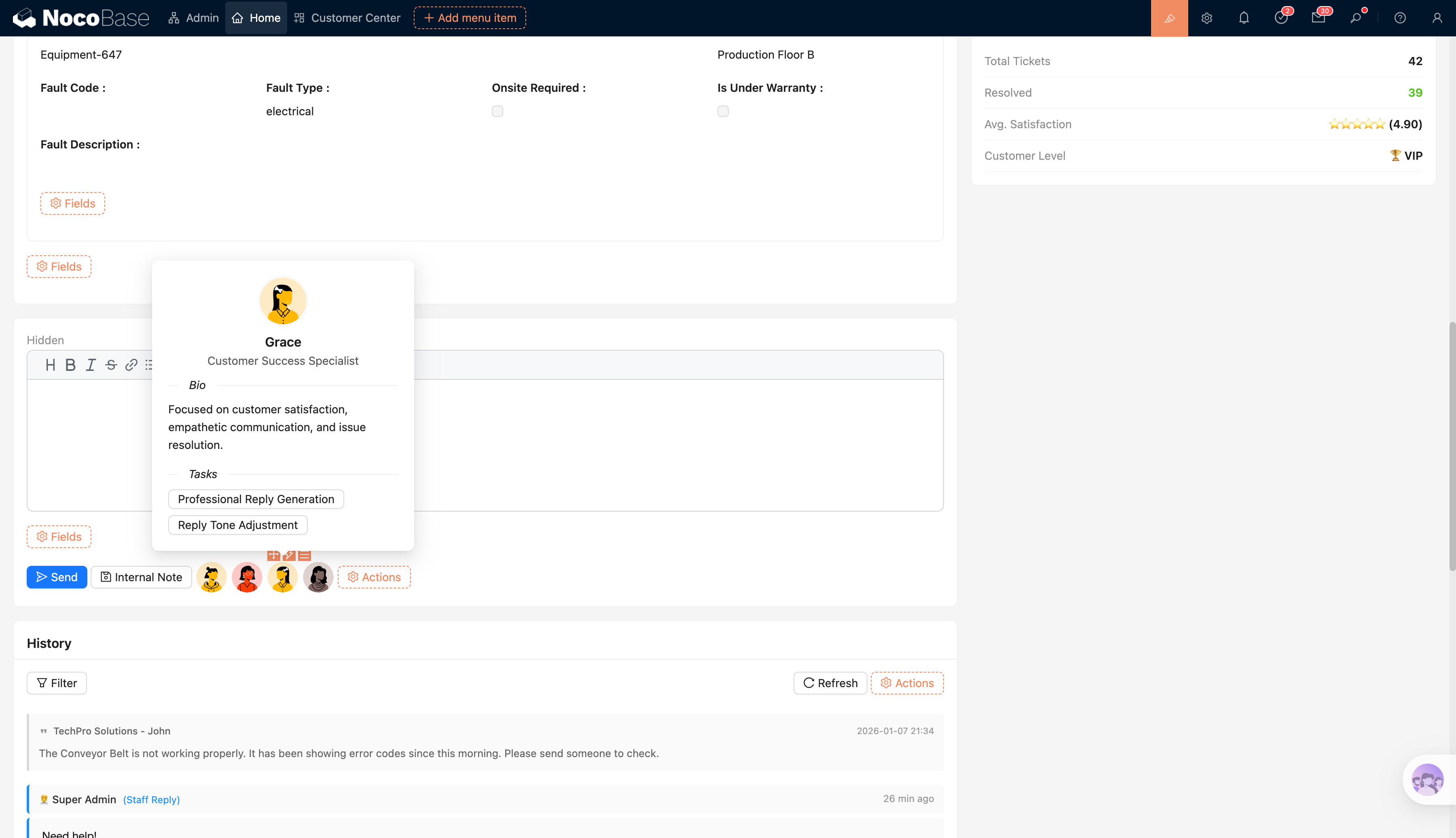
Use Cases
NocoBase can be widely applied to internal enterprise management and business system construction, and is suitable for scenarios that require data visualization, multi-user collaboration, and flexible expansion. Currently, NocoBase has launched three major enterprise-level solutions:
- CRM systems: Manage customer data, track leads, and visualize the sales pipeline.
- Ticketing systems: Handle IT support, after-sales, or internal task management with clear assignment and tracking.
- Project management: Monitor tasks, deadlines, and team collaboration with data tightly integrated into workflows.
NocoDB
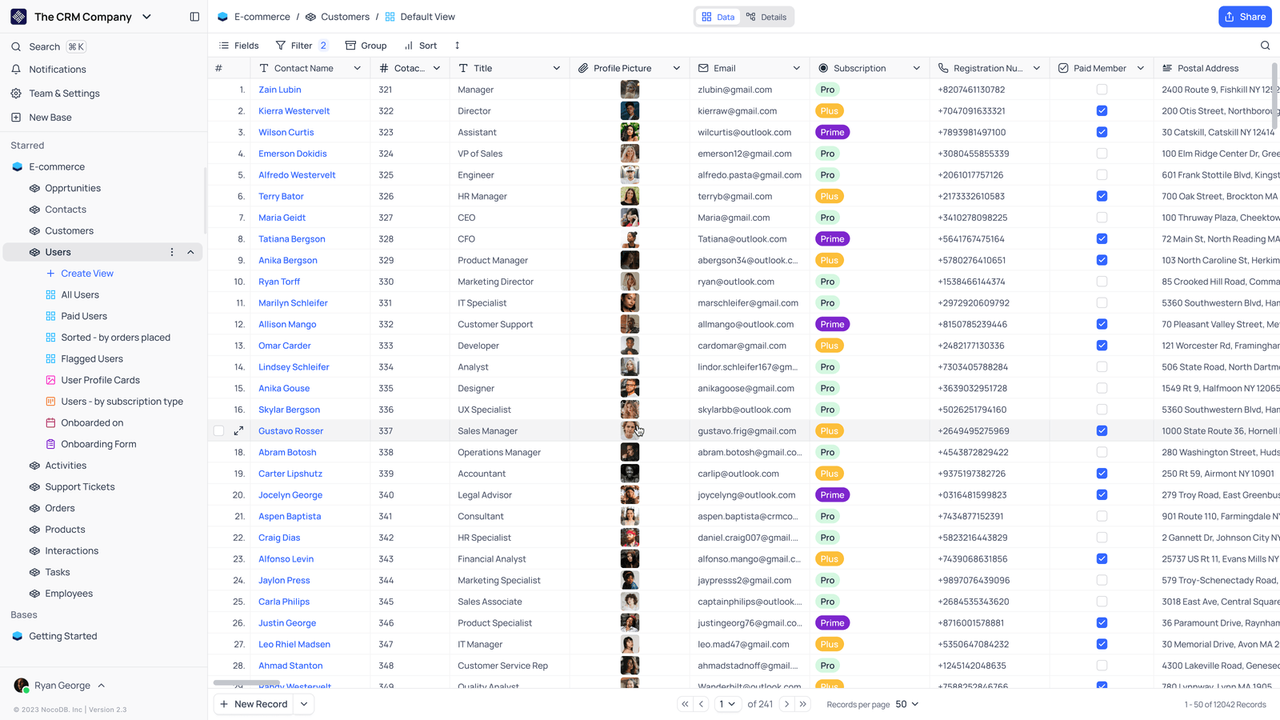
Overview
NocoDB is an open-source no-code database management tool that turns traditional relational databases (MySQL, PostgreSQL, SQLite, etc.) into a spreadsheet-like interface for easier data management and app building.
- GitHub Star:⭐57.7k
- GitHub:https://github.com/nocodb/nocodb
- Website: https://nocodb.com/
Key Highlights as an Access Alternative
- Spreadsheet View: Presents database data in a spreadsheet-like view similar to Excel, allowing users to operate data without writing SQL.
- No-Code Application Development: By using simple drag-and-drop actions, users can create complex business logic and data management applications.
- Multi-User Support: Supports team collaboration and multi-user operations, with permission management to control data access and operations.
- API Support: Automatically generates REST APIs, enabling data access and operations via APIs, making it easier to integrate with other systems.
Use Cases
- Project Management: Quickly build task allocation, progress tracking, and team collaboration platforms.
- Customer Relationship Management: Centralize customer information, sales leads, and business opportunities.
- Inventory Management: Record product information, track inventory status, and set up automatic reminders.
💡 Read more: NocoBase vs NocoDB: An In-Depth Comparison of Open Source No-Code Tools
Baserow
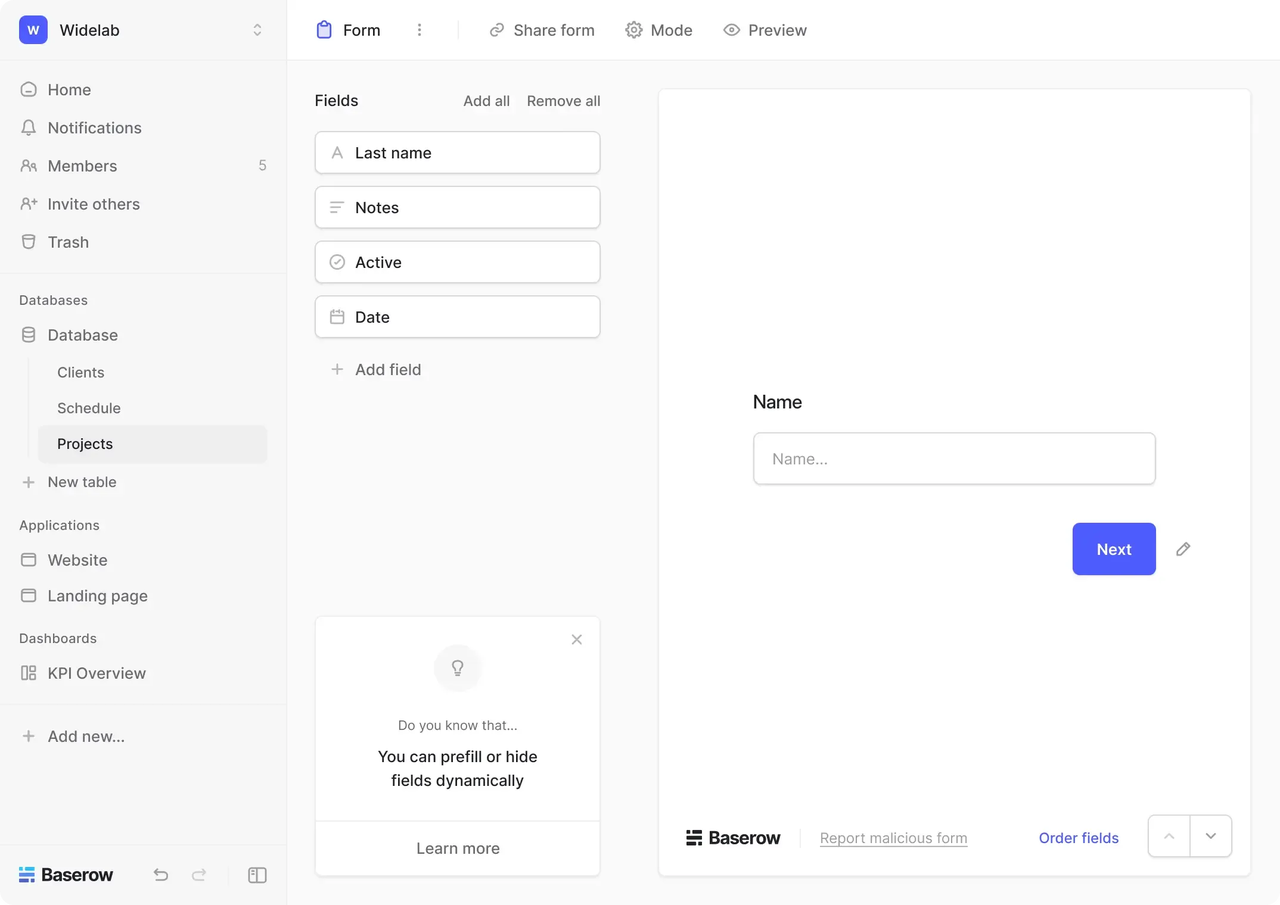
Overview
Baserow is an open-source no-code database and application-building platform that allows users to create and manage databases without programming knowledge.
- GitLab Star:⭐2.2k
- GitLab:https://gitlab.com/baserow/baserow
- Website: https://baserow.io/
Key Highlights as an Access Alternative
- No-Code Platform: Users can create and manage databases through an intuitive interface, with no coding required.
- API-First: Every feature can be integrated via API, making data exchange with other systems easy.
- Plugin Extensions: Supports customization and extension of frontend and backend plugins to meet diverse business needs.
- Self-Hosting and Cloud Deployment: Offers both self-hosted and cloud deployment options, allowing users to choose what best fits their requirements.
Use Cases
- Marketing Campaign Management: Centrally manage campaign planning, participant information, and performance tracking.
- Data Collection and Organization: Consolidate multi-channel data through visualized tables.
- Collaborative Team Database: Share and update data across departments in real time.
💡 Read more: 6 Open-Source no-code Database Tools Like Airtable and Notion
LibreOffice Base
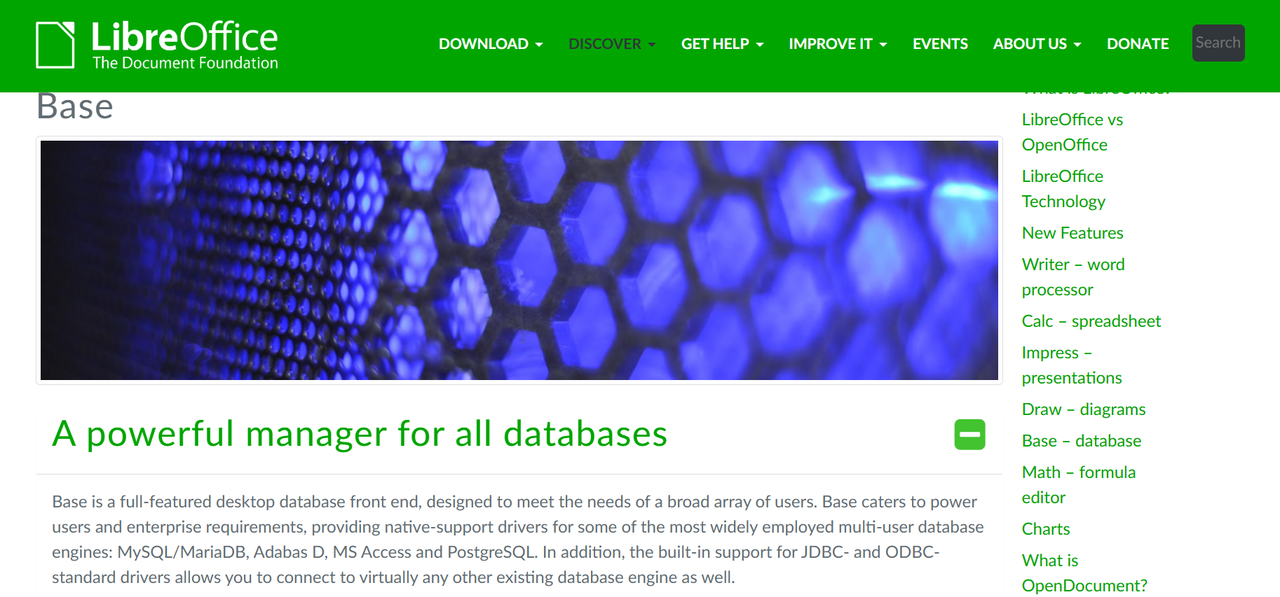
Overview
LibreOffice Base is the database management tool within the LibreOffice suite. It provides a graphical user interface that allows users to create, access, modify, and view databases and their data.
- GitHub Star:⭐3.3k
- GitHub:https://github.com/LibreOffice/core
- Website: https://www.libreoffice.org/discover/base/
Key Highlights as an Access Alternative
- Cross-Platform Compatibility: Supports Windows, macOS, and Linux, making it versatile across environments.
- Graphical User Interface: Provides a GUI that simplifies the process of creating and managing databases.
- Multiple Database Support: Compatible with various database systems, including MySQL, MariaDB, and PostgreSQL.
Use Cases
- Personal Database Management: Manage contacts, book collections, or research data.
- Small Business Data Storage: Maintain customer information, inventory data, and sales records.
- Reports and Query Generation: Quickly output structured reports, with support for printing and sharing.
Kexi
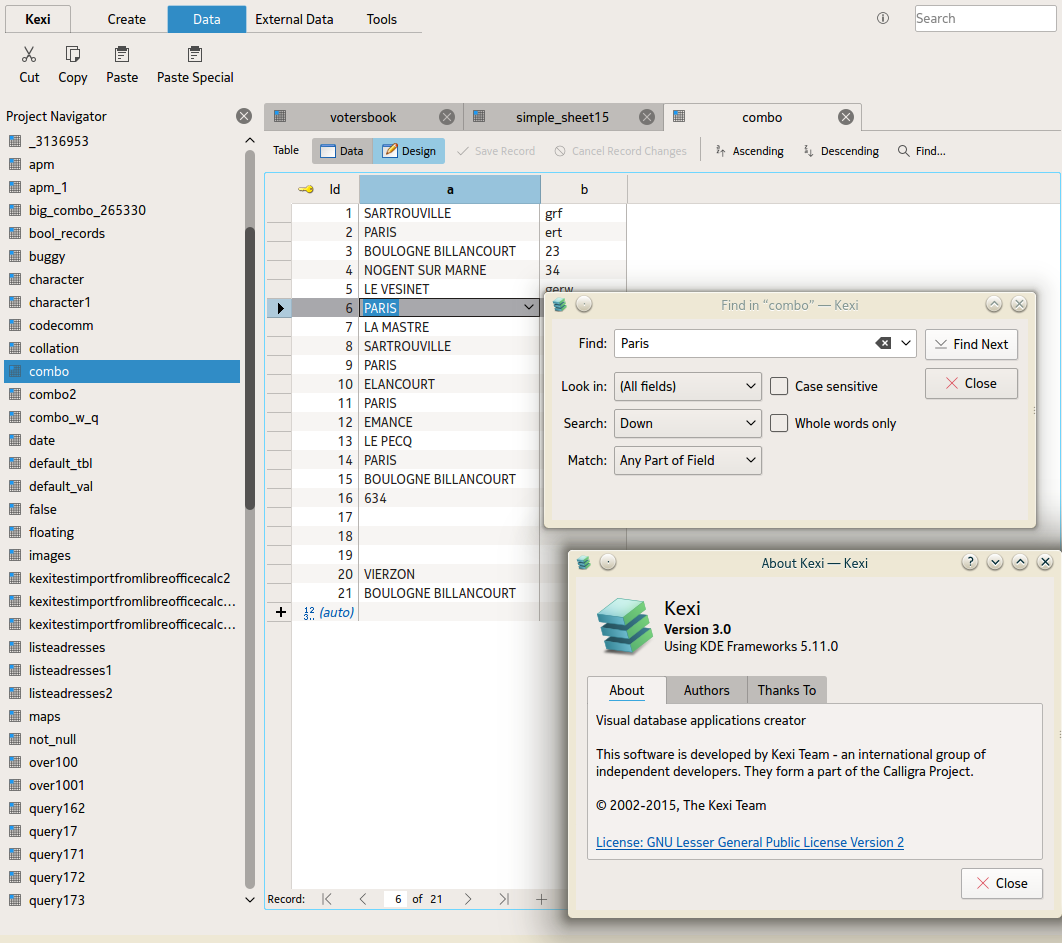
Overview
Kexi is an open-source visual database application builder designed to fill the gap between spreadsheets and more complex database services that require advanced development.
- GitHub Star:⭐50
- GitHub:https://github.com/KDE/kexi
- Website: https://kexi-project.org/en/
Key Highlights as an Access Alternative
- Visual Designer: Provides a visual designer that simplifies the creation and modification of database tables.
- Form and Report Generation: Supports the creation of forms and reports for easier data input and output.
- Multiple Database Support: Works with PostgreSQL, MySQL, SQLite, and more.
- Data Processing Functions: Offers insertion, editing, querying, and processing capabilities to handle diverse data management needs.
Use Cases
- Form-Driven Applications: Provide user-friendly data entry forms for business staff.
- Data Visualization Reports: Generate intuitive charts and statistical analysis results.
DBeaver
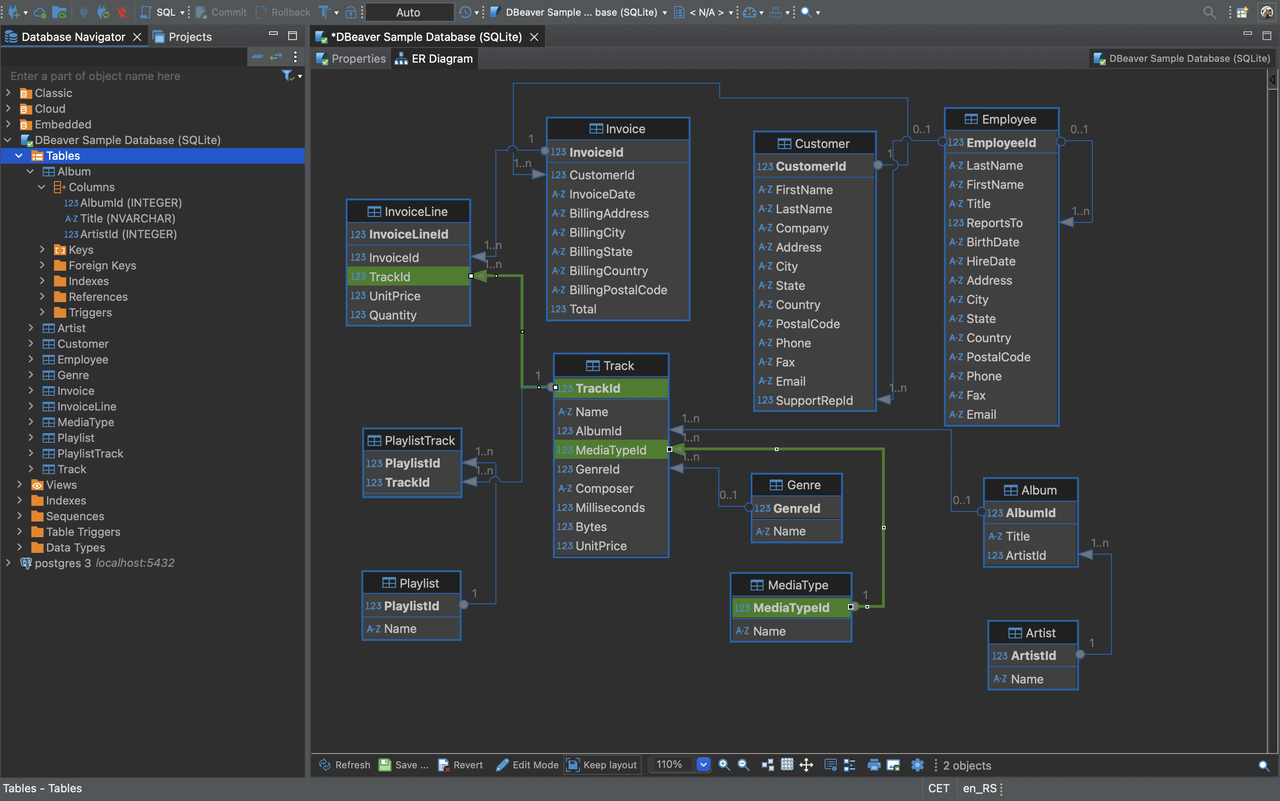
Overview
DBeaver is an open-source universal database tool that supports a wide range of database systems, including both SQL and NoSQL databases.
- GitHub Star:⭐45.5k
- GitHub:https://github.com/dbeaver/dbeaver/
- Website: https://dbeaver.io/
Key Highlights as an Access Alternative
- Broad Database Support: Compatible with MySQL, PostgreSQL, SQLite, MongoDB, and many others.
- Graphical User Interface: Provides a GUI to simplify database management and operations.
- SQL Editor: Includes a powerful SQL editor with code completion and syntax highlighting.
Use Cases
- Cross-Database Queries: Manage and operate multiple types of databases simultaneously.
- Development and Debugging: Assist developers in writing and testing SQL scripts.
- Data Analysis: Visualize query results to support business analysis and decision-making.
Final Thoughts
As highlighted by the user feedback at the beginning, Microsoft Access often encounters real-world limitations in performance, scalability, and collaboration. As businesses grow, many teams realize the need for more flexible and modern alternatives.
The open-source options introduced here provide solutions tailored to different use cases:
- If you need visual modeling and enterprise-grade extensibility, NocoBase or NocoDB are the best fit.
- If you prefer spreadsheet-style collaboration, Baserow is a good choice.
- If you prefer traditional desktop-style databases, LibreOffice Base and Kexi are reliable options.
- If you are a developer or data analyst, DBeaver provides the most powerful cross-database support.
If you find yourself constrained by the limitations of Microsoft Access, these open-source tools can help you transition to a more modern, collaborative, and scalable solution that aligns with your business needs.
Related reading:
- 6 Best Open Source Alternatives to Jira
- 7 Powerful Open Source Alternatives to Zapier
- 5 Best Open-Source Alternatives to ServiceNow (with Pricing Comparison)
- 6 Open-Source Firebase Alternatives for Self-Hosting and Data Control
- The Best Open-Source Alternatives to AppSheet in 2025
- Why Open-Source Alternatives Are Replacing OutSystems in 2025?